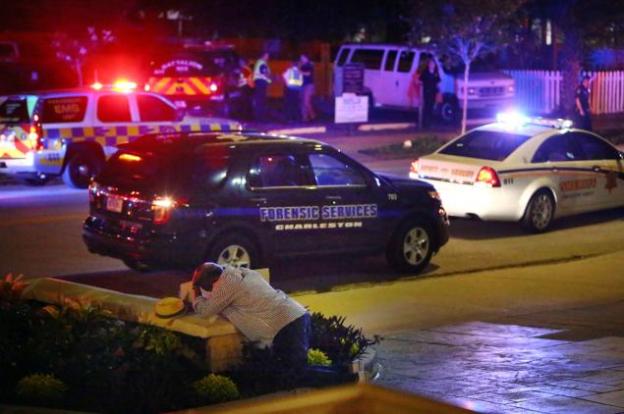My sight has failed me because of trouble; *
LORD, I have called upon you daily; I have stretched out my hands to you.
Do you work wonders for the dead? *
will those who have died stand up and give you thanks?
Will your loving-kindness be declared in the grave? *
your faithfulness in the land of destruction?
Will your wonders be known in the dark? *
or your righteousness in the country where all is forgotten?
But as for me, O LORD, I cry to you for help; *
in the morning my prayer comes before you. (Psalm 88:10-14)
The Rev. Dr. Eric H.F. Law of the Kaleidoscope Institute, in his book The Wolf Shall Dwell With the Lamb, describes the “Cycle of Gospel Living.”
This cycle is also used in the Education for Ministry program in which mentors and our students reflect on “Living Faithfully in a Multicultural World.”

The psalmist and the martyrs of Charleston — along with the African-American community more generally — have entered the cycle of Gospel living from the point of powerlessness.
How long, O Lord?
Will you forget me for ever?
how long will you hide your face from me? (Psalm 13:1)
Their endurance has united them with the suffering of Jesus on the cross, whose suffering is not the end of the story. The cross leads to the empty tomb, to resurrection, and to the power of life in Christ.
After an event like the shooting at Emmanuel AME Church in Charleston, social media is justifiably full of anger directed toward well-meaning (mostly white) Christians who “have treated the wound of my people carelessly, saying ‘Peace, peace’ when there is no peace” (Jer. 6:14).
In his 1963 Letter From a Birmingham Jail, the Rev. Martin Luther King, Jr. spoke of his disappointment with the “white moderate, who is more devoted to ‘order’ than to justice”:
Shallow understanding from people of good will is more frustrating than absolute misunderstanding from people of ill will. Lukewarm acceptance is much more bewildering than outright rejection.
The problem now (as then) is that we are all speaking about the Gospel, but we are talking past each other.
What we “well-meaning Christians” must understand is that we enter the cycle of Gospel living from a completely different position than many (most?) Christians do.
We participate in the cycle when we give up our power, “just as the Son of Man came not to be served but to serve, and give his life a ransom for many” (Matt. 20:28).
We participate by falling and failing, by giving up our power and privilege, which no one is taking away from us.
Richard Rohr writes in his daily reflection that:
This is why Christianity has as its central symbol of transformation a naked, bleeding man who is the picture of failing, losing, and dying … and who is really winning — and revealing the secret pattern to those who will join him there.
All of us who are Christians participate in the cycle of Gospel living. All of us center our lives on the crucified and risen Jesus.
But we experience the cycle of Gospel living differently from each other, we come to the saving knowledge of Christ’s death and resurrection from different directions, and we must be tender with one another for Jesus’ sake.
A Collect for Fridays
Almighty God, whose most dear Son went not up to joy but first he suffered pain, and entered not into glory before he was crucified: Mercifully grant that we, walking in the way of the cross, may find it none other than the way of life and peace; through Jesus Christ our Lord. Amen. (BCP 99)
A Prayer for Mission
Lord Jesus Christ, you stretched out your arms of love on the hard wood of the cross that everyone might come within the reach of your saving embrace: So clothe us in your Spirit that we, reaching forth our hands in love, may bring those who do not know you to the knowledge and love of you; for the honor of your Name. Amen. (BCP 101)

